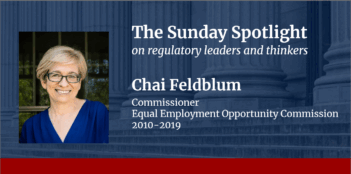
Scholar argues that a textualist understanding of Title IX reveals that it prohibits anti-LGBT discrimination.
In his first weeks in office, President Donald J. Trump signed a series of executive orders on the interpretation of Title IX, the federal law banning sex-based discrimination in education programs and activities that receive federal funding.
Notably, many of these executive orders concern LGBT issues, such as prohibiting transgender women from participating in women’s sports. In justifying the prohibition, the Trump Administration claims that Title IX not only does not prohibit covered entities from excluding transgender women from participating in women’s sports but actually requires them to do so.
At least one scholar, however, disagrees.
In a recent article, Katie Eyer, a professor at Rutgers Law School, argues that Title IX’s text provides clear guidance on many of the most contested Title IX issues. In particular, the plain language of Title IX unequivocally prohibits discrimination based on sexual orientation and gender identity, explains Eyer.
Eyer observes that commentators have largely overlooked Title IX’s text because they treat administrative interpretations—such as the regulations issued by the U.S. Department of Education—as the law of Title IX instead.
Eyer contends, however, that Title IX’s text should constrain agencies’ interpretive discretion due to “the rise of textualism and the fall of administrative deference.” In the wake of Loper Bright Enterprises v. Raimondo, the U.S. Supreme Court decision overturning the Chevron doctrine, courts may no longer defer to administrative interpretations and must “exercise their independent judgment” to find the “best reading” of a statute. Moreover, because the reasoning of Loper Bright itself relies on a textualist reading of the Administrative Procedure Act, textualism is likely to become the primary approach for courts to determine the “best reading” of Title IX after Loper Bright, explains Eyer.
Title IX’s core anti-discrimination provision provides that no individual should be subject to discrimination “on the basis of sex.”
Eyer points out that many of the important terms in Title IX have established meaning. To begin with, the Supreme Court has held that “based on”—a term that is essentially identical to “on the basis of”—connotes a but-for causation, which asks whether a discriminatory treatment could have occurred without considering the individual’s sex. In addition, the Court has also made clear that “discrimination” means to treat an individual worse compared to other similarly situated individuals. Finally, “sex,” at a minimum, means biological sex as either male or female, Eyer notes.
Eyer argues that reading Title IX as proscribing anti-LGBT discrimination does not require redefining “sex” as sexual orientation or gender identity. Rather, Title IX’s plain textual meaning prohibits anti-LGBT discrimination because one cannot discriminate against an LGBT individual without discriminating against the individual’s sex, contends Eyer.
Consider, for example, a school that expels a transgender boy, whose sex is assigned female at birth, after he comes out as male. Eyer notes that because the school would not have objected to the student’s gender identity as male if the student were assigned male at birth, the adverse differential treatment is motivated by the student’s sex and constitutes sex-based discrimination prohibited by Title IX.
Furthermore, Eyer notes that the Supreme Court has already affirmed this position in Bostock v. Clayton County. In Bostock, the Court applied the textualist approach and held that anti-LGBT discrimination constitutes sex-based discrimination under Title VII, which prohibits sex discrimination in employment. Observing that Title IX’s core language is virtually identical to that of Title VII, Eyer contends that Bostock’s textualist analysis leads to the conclusion that Title IX also outlaws anti-LGBT discrimination.
Eyer notes that some lower courts nonetheless have refused to apply Bostock in the Title IX context. For example, in upholding an injunction against a Biden Administration’s Education Department rule providing that Title IX prohibits anti-LGBT discrimination, the U.S. Court of Appeals for the Sixth Circuit reasoned that Bostock does not control because Title VII and Title IX serve different goals. As a result, legal principles established under Title VII do not always extend to Title IX.
The Sixth Circuit’s reasoning, however, focused on policy arguments and overlooked Title IX’s plain text, underscores Eyer. Eyer explains that the Sixth Circuit offered no textual argument on how one can discriminate LGBT individuals without treating them differently based on their sex.
Turning to the Trump Administration’s interpretation on Title IX, Eyer observes that so far the Administration has mainly relied on executive orders to express its view on LGBT issues, which are non-binding on regulated entities. If agencies, including the Education Department, were to issue binding regulations on Title IX, their interpretive authority would be limited, contends Eyer.
Title IX contains a statutory delegation to agencies, which states that agencies are “authorized and directed to effectuate” the core anti-discrimination provision of Title IX. As a result, agencies may not adopt regulations that are inconsistent with that provision. Eyer argues that because the plain language of Title IX’s core anti-discrimination provision prohibits anti-LGBT discrimination, the Trump Administration’s Education Department cannot issue regulations that exclude LGBT individuals from Title IX’s protection.
Eyer concludes by emphasizing the value of textualism in the administrative state: “The promise of textualism is the promise of the application of the law as written on equal terms to all.” To realize this promise, however, institutions entrusted with resolving the highly politically polarized issues surrounding Title IX—such as administrative agencies and courts—must resist introducing their political preferences and be faithful to what the law says, underscores Eyer.



